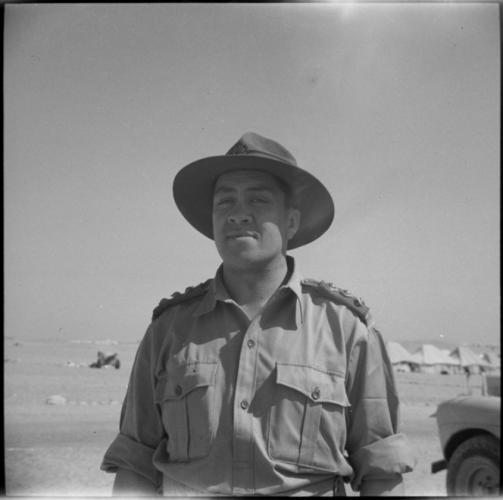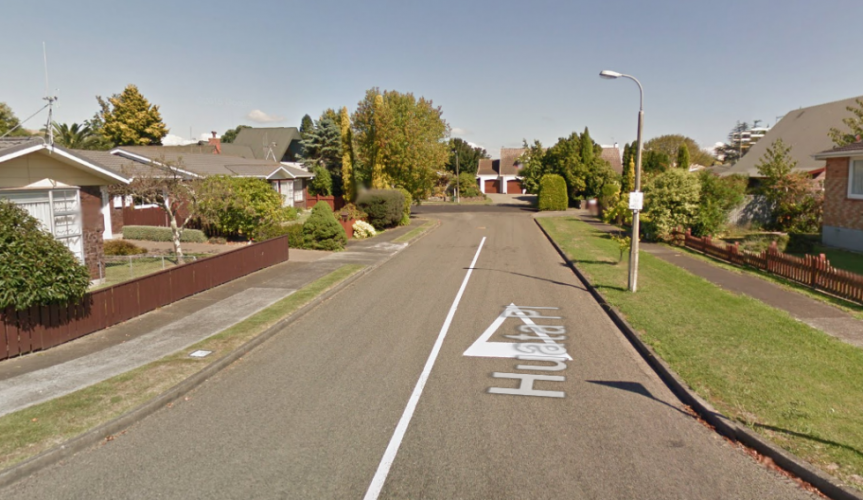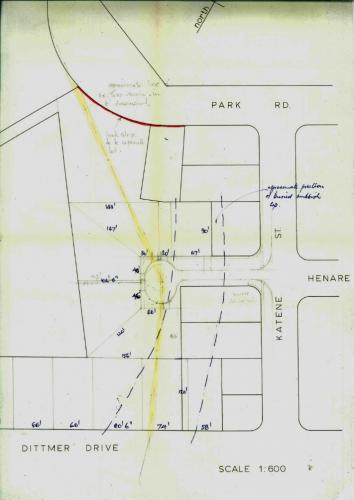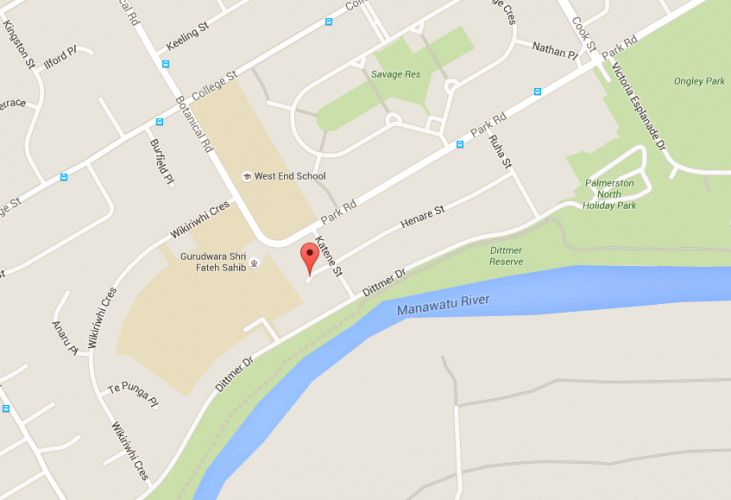096 Huata Street Palmerston North, street scene 2017
Reason for the name
This street was named in honour of Padre Wiremu Te Tau Huata CBE, QSO, MC, 28th Maori Battalion
Prior to its subdivision, the land known as Awatapu was a golf course and grazing area situated next to the Manawatu River. In order to free up land for residential development and increase revenue, a Council meeting of 16 April 1963 resolved to subdivide the area via “disposal of sections through Land Agents at pre-determined figures fixed by the Council”. The new Awatapu College had to be allowed for, and the old Awatapu Golf Links shifted upstream to Brightwater Terrace, which then became the Palmerston North Golf Club. The main access road through the area was at first known as Awatapu Avenue.
Huata Place is a small cul-de-sac running off the western end of Henare Street with, being surrounded by other prominent 28th Māori Battalion names. It has approximately 10 residential houses running off it. The Palmerston North Holiday Park, Awatapu College and historic Savage Crescent are also in the area, with the Manawatu River running parallel to the south of the road.
As part of the process of subdividing and naming streets, George Dittmer was contacted in late 1964 to give his thoughts on the naming of streets after 28th Māori Battalion soldiers as a commemoration of their service to their country. Dittmer provided a comprehensive list of soldiers who had served under him which was later utilised by the Council to adopt further street names in the Awatapu subdivision. Although not on the original list, Wiremu Huata’s name was included upon later revision as he was one of the most prominent chaplains serving in the Battalion.
Author: Evan Greensides, Research Assistant for the Palmerston North City Library.
Wiremu Te Tau Huata was born on 23 September 1917 at Mohaka, Hawke’s Bay, the eighth of eleven children of Hemi Pititi Huata and his wife, Ropine Aranui. Wiremu’s parents brought up many children besides their own: Wiremu was to eventually say he had 42 brothers and sisters. He attended Mohaka Native School and Te Aute College, undertaking theological studies there until 1938. He excelled at rugby, later representing Central Hawke’s Bay and Wairoa.
Wiremu continued his theological training in the Wairoa–Mohaka Māori pastorate. He was consecrated deacon in the Takitimu meeting house in 1939, and ordained priest in August 1940 at Manutuke. Later in 1940 he was posted to Waipatu–Moteo Māori pastorate as assistant curate. He was the third in a succession of Anglican Māori ministers from the Huata family, their careers spanning most of the history of Christianity in New Zealand. He was to continue this tradition of ministering, the same as his father, Hemi, and his paternal grandfather, Tamihana.
In June 1943, persuaded by Sir Apirana Ngata, Wiremu enlisted for service in the armed forces as a chaplain. After training at Trentham Military Camp he sailed with the rank of captain in July with the 10th Reinforcements, along with his younger brother Te Okanga Huata. On his arrival in Egypt he joined the 28th Māori Battalion, whereupon they were refitted and sent to the mainland of Europe in October. The Italian campaign was just beginning for the Battalion, and Padre Huata was often in the front line with the troops, walking about without a helmet through the shell fire. His lighter duties included acting as father-confessor to soldiers (regardless of denomination), captaining the battalion rugby team, helping to stage concerts, presiding over church parades, and conducting prayers and hymns before battle. As with many of the battalion’s men he learnt Italian, especially Italian songs; Wiremu was famous for his rendition of romantic songs and, decades later, would sing them at battalion reunions and after memorial services.
Wiremu’s grim duties included searching for bodies on the battlefield and supervising the digging of graves for the dead – both the battalions’ and enemies’ -, reading the burial service, recording the map references of burial places for future recovery of the bodies and handing in identity tags. When the fighting in Europe ceased in May 1945 the Battalion was stationed in Trieste. He conducted memorial services for the dead of the Battalion at war cemeteries near the principal battlefields, including Suda Bay in Crete, and at Cassino and Sangro military cemeteries. At these he led a choir of soldiers he had trained, also visiting smaller burial sites in Italy. In December 1945 he was awarded the Military Cross for his leadership throughout the campaign.
Wiremu returned to New Zealand with the Battalion in January 1946 and resumed his ministry soon after as vicar in the Waipatu–Moteo Māori pastorate. On 17 July 1947, at Waipatu, he married Ringahora Heni Ngakai Ybel Tomoana. In 1950 Wiremu was transferred to Te Ngae, Rotorua. In 1952 he moved to the King Country and Waikato. He was based in Te Kuiti for a while, then Ngaruawahia, and later Hamilton. Working as priest in charge of the King Country Māori district and the diocese of Waikato Māori mission from 1952, was made a canon of St Peter’s Cathedral, Hamilton, in 1954, and became superintendent of the Waikato mission in 1960.
Wiremu’s work was not confined to his Waikato–Maniapoto parish. He presided over the organising committee for the dominion conference of the Māori Women’s Welfare League in 1961; took part in 1968 in the consecration of Manu Bennett as Bishop of Aotearoa; and from the 1970s he promoted Moral Re-armament amongst Māori. In 1972 Wiremu accompanied 26 Māori Battalion veterans to Mainz, Germany, to attend a reunion of the Afrika Korps. In Wairoa he joined his brother Aussie and Sir Turi Carroll in founding Nga Hokowhitu a Tumatauenga, a national organisation for Māori returned servicemen.
In 1977 Wiremu undertook a major overseas tour. After performing baptisms in Sydney, he visited war cemeteries in the Middle East, North Africa, Crete, Italy and Gallipoli. The group in which he travelled had a private audience with Pope John Paul I. In 1989 he embarked on a similar trip with a small group of veteran officers and a film crew from Television New Zealand to make a documentary on the Māori Battalion in the Second World War. When things went wrong – which they often did – Wiremu calmed and united the group with karakia. His memories, jokes and Italian songs evoked the Italian campaign, and his spiritual counselling ensured the success of the trip and the project.
Wiremu Te Tau Huata died in Hastings on 20 December 1991, survived by his wife, four sons and four daughters. He was buried in the family cemetery at Ramoto, Wairoa.
Honours and Awards
- Commander of the Most Excellent Order of the British Empire (CBE)
- Queen’s Service Order (QSO)
- Military Cross (MC)








